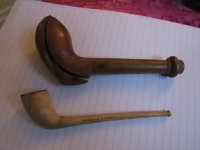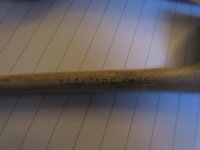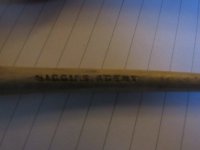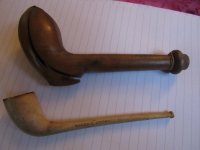hi all just came across this pipe and wondered if anyone could id it for me i think it says higgins. agent on one side and yacting pipe on the other? many thank
Please Help ID this Old Clay.
- Thread starter spark123
- Start date
You are using an out of date browser. It may not display this or other websites correctly.
You should upgrade or use an alternative browser.
You should upgrade or use an alternative browser.
SmokingPipes.com Updates
Watch for Updates Twice a Week
God I feel like one those guys from the Antiques Road Show! What you have is very nice 1880/90 wooden clay pipe carry case. The front hinges up and the pipe sides in. They tend to show up made of 'Japaned' tin and where sometimes given away by brewing companies and such with a beer advert on the side. The idea was to preserve the life of a clay pipe since carrying it around would usually result in it breaking. Trust me on this point as my local boozer in the U.K is still covered in busted pipe shards from long before I moved to the U.S. They are quite desirable and don't show up that often and when the do come to market are usually designed to accommodate the traditional 'cutty' pipe with the foot. How did you come by it if I may ask?
Photos in focus with brighter lighting would make the nomenclature easier to read! Though I bet our experts don't need that help.
Higgles Agent - interesting. It is not a Pollock pipe or one of the other more common clay pipe makers. The use of the word 'Agent' might be a produce agent, corn broker. My knowledge on clays begins and ends with Gordon Pollocks pipes from Stott Street in Manchester. Are you in the U.K or overseas?
@condorlover1 I had a Pollock pipe until it got broke:-(Higgles Agent - interesting. It is not a Pollock pipe or one of the other more common clay pipe makers. The use of the word 'Agent' might be a produce agent, corn broker. My knowledge on clays begins and ends with Gordon Pollocks pipes from Stott Street in Manchester. Are you in the U.K or overseas?
Just heard from @Maddogsmokers that I've won the clay pipe smoking competition - I win three clay pipes and a jar of bacca!
So you have said elsewhere Dan. Just remember to varnish the mouth pieces and please old fellow try and sort of stay on topic. If you look in your local flea market you might find one of those clay carry cases and cut down your pipe casualties. 
hi all im in sunny uk, thanks for your help hope someone can id the makers mark i will try to take some better pics
These guys will be able to help - Society for Clay Pipe Research
whilst enjoy his enthusiasm.He cant post a single post without the mention of him smoke a clay pipe on topic or notSo you have said elsewhere Dan. Just remember to varnish the mouth pieces and please old fellow try and sort of stay on topic. If you look in your local flea market you might find one of those clay carry cases and cut down your pipe casualties.
These guys will be able to help - Society for Clay Pipe Research
Good advice. Also reach out to Dr. David Higgins of the National Pipe Archive (NPA home - http://www.pipearchive.co.uk/) which specializes in research into clay pipes. If he has time to answer I'm sure he would be a terrific resource.
Clays aren't really my thing, but my offhand guess would be the clay was sold by John Higgins. I wrote something about him a few years ago in reply to a different inquiry, which I'll reproduce here in a slightly updated and redacted form:
John Higgins, founder of the eponymous company, was born in Hammersmith, London in 1823. His parents were John and Mary Ann, and at the time of his birth uninvolved in the pipe or tobacco industries. In 1861 John married Charlotte Ann Leadbeater (not his first wife). At that point his father's profession is listed as a silversmith. The link between silversmiths and pipes is well known, and highly suggestive about John's entry into the trade some time before his marriage to Charlotte. In the wedding register John is listed as an importer of fancy goods. In fact we know that by then John had been making and/or importing pipes for over a dozen years: a company listing in 1906 claims 1848 as the year the business was established. Over the years references to the company's activities vary, however, and it is not entirely clear the degree to which he manufactured entire pipes, or just stems, or was essentially an importer. Here are sample descriptions from successive London city directories:
1855 "ivory & hardwood turner & importer of meerschaum pipes"
1865 "pipe & stem manufacturer, & importer of meerschaum bowls, & agent for Irish, scotch, & french clays" [italics mine]
1870 "pipe & stem manufacturer, & importer of meerschaum & brier root pipes"
The last description remained in directories for many years afterwards.
Also of interest is an 1866 advertisement for Edwin Southorn's patent Broseley churchwarden pipes. Broseley clays have a long and storied past (see: Broseley Clay Tobacco Pipes - http://www.broseleypipes.co.uk/), and it's perhaps significant, remembering the stamping on your pipe, that John Higgins was the sole London agent for these pipes.
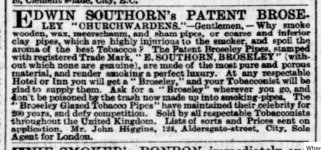
We do know that John sold many ancillary products and was what was then called a "sundriesman"; similarly, in most of the later censuses and business directories John and his company are generally listed as being an importer of fancy goods. During his lifetime the business had three successive locations, all in the greater London area; it started at 23 Wilderness Row, moved to 143 Aldersgate Street, and for about the last fifteen years before his death was at 10 Long Lane. There it remained until 1940, a few years before it disappeared from the London phone directories.
When John died in 1896 he left a sizable estate of 23,743 pounds (over $3 million in today's money). His wife Charlotte having predeceased him, John left two sons and three daughters still living in 1896. From what I can tell none of the children (or their spouses) went into the family business. What's clear is that about four months before he died John sold the company to Bob Reginald ("B. R.") Arkell.
The son of a miller, Arkell was a cigar dealer/tobacconist born in Abingdon, Berkshire in 1842. He appears to have been interested in growing his business through acquisition (what today might be called a roll-up play), and after acquiring John Higgins & Co announced that he would "amalgamate with it the business of Mr. Eduoard Wolf". Arkell's name appears in various other contemporary records as a principal in other wholesale and retail tobacco businesses, including something called "The Tobacconists' Supply Syndicate".
Arkell died in the fall of 1919, leaving his widow (second wife, Catherine Eleanor) a fortune of about 20,400 pounds. Bob and Catherine had two sons, Robert (1871-1949) and Thomas Reginald (1875-?). Robert went into the family business, while Thomas became a naval cadet. I haven't dug much deeper than this, and so the history becomes murky at this point. Robert married and had three sons, and it is possible that they were involved in the family business with their father. But apparently not for too long. John Higgins & Co. disappears from the London phone books during WW2; it's listed in 1941, but gone by 1943 (1942 is missing from the run I consulted). So either the company changed its name, although there's no sign of it that I could find, or it was an economic casualty of the war.
So that's my guess, and it's only that, about the Higgins who was the agent for your pipe.
Cheers,
Jon
Wow. What a fantastic reply!
I am glad I edited the title to include the word "please".

I am glad I edited the title to include the word "please".
Thanks for the link Slacey! I've been reading through some old newsletters on the site, very interesting!These guys will be able to help - Society for Clay Pipe Research
Looks like an Advertising Pipe, as previously mentioned.
A quick look through some of my clay pipe books......looks like #40.
"Plain pipe bowl, mid 1800s to late Victorian period."
I'd clean it and smoke it.....but that's just me, I'm funny like that.
That pipe case though..... I'd almost knock an old lady over for that one.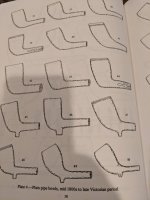
A quick look through some of my clay pipe books......looks like #40.
"Plain pipe bowl, mid 1800s to late Victorian period."
I'd clean it and smoke it.....but that's just me, I'm funny like that.
That pipe case though..... I'd almost knock an old lady over for that one.

A few final remarks. This doesn't speak to who Higgins was, but on the question of whether Edwin Southorn (for whom John Higgins was at one time the London agent) made your pipe on balance I'd say no. On the one hand Southorn definitely had a Yachting pipe in his line. See the small print in the bottom of this ad from an 1874 issue of the Yorkshire Monthly Magazine:
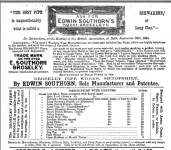
On the other hand Southorn's pipes had an incuse marking on the stem. If this was one of his you'd expect to see "E Southorn - Broseley" (or one of two other marks) impressed into the stem of the pipe. It's apparent absence militates against it being a Southorn product. For the information on Southorn markings I'm indebted to Dr. Harris's dissertation from 1987 (see: http://www.pipearchive.co.uk/pdfs/Clay/Higgins/Higgins 1987 - Broseley Pipe Thesis.pdf), a very illuminating work if you're interested in much more background on the clay pipe industry.
Any mistakes in this post are obviously my own, not Dr. Harris's. His study of clay pipe manufacturing in the Broseley district and subsequent academic career offer abundant evidence, if any were needed, that Dr. Harris is the person you should reach out to for a knowledgeable verdict on the origin of your pipe. He, if anyone, might be able to say to what extent Yachting was a common model name for clay pipes in the second half of the 19th century, who might have made your pipe, and perhaps which Higgins sold it.
Jon

On the other hand Southorn's pipes had an incuse marking on the stem. If this was one of his you'd expect to see "E Southorn - Broseley" (or one of two other marks) impressed into the stem of the pipe. It's apparent absence militates against it being a Southorn product. For the information on Southorn markings I'm indebted to Dr. Harris's dissertation from 1987 (see: http://www.pipearchive.co.uk/pdfs/Clay/Higgins/Higgins 1987 - Broseley Pipe Thesis.pdf), a very illuminating work if you're interested in much more background on the clay pipe industry.
Any mistakes in this post are obviously my own, not Dr. Harris's. His study of clay pipe manufacturing in the Broseley district and subsequent academic career offer abundant evidence, if any were needed, that Dr. Harris is the person you should reach out to for a knowledgeable verdict on the origin of your pipe. He, if anyone, might be able to say to what extent Yachting was a common model name for clay pipes in the second half of the 19th century, who might have made your pipe, and perhaps which Higgins sold it.
Jon
I used to have a Southorn of Broseley pipe but it got broke:-(
Got an ROAB Buffalo pipe but I am leaving it unsmoked.
Smoked my previous Buffalo pipe at the Lace Wars re-enactment in 2019 with Gawith Hoggarth Cherry Vanilla...
Currently smoking Gawith Hoggarth North Star ? in a Markus Fohr clay pipe.
Got an ROAB Buffalo pipe but I am leaving it unsmoked.
Smoked my previous Buffalo pipe at the Lace Wars re-enactment in 2019 with Gawith Hoggarth Cherry Vanilla...
Currently smoking Gawith Hoggarth North Star ? in a Markus Fohr clay pipe.








